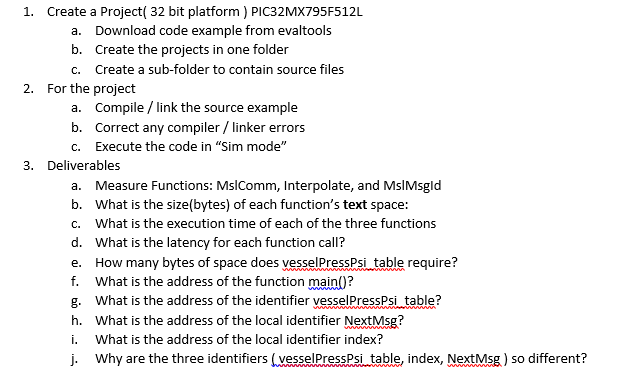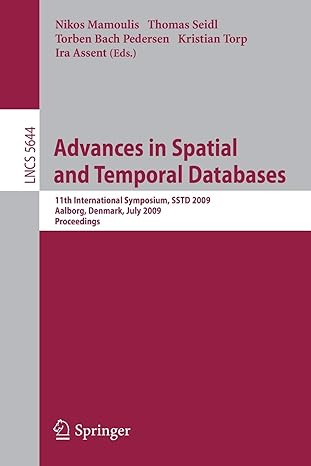Question
--------------------------------------------------------------------------------------------------------------------------------------------------------------------------------------------------------------------- c .code Programming assignment 14 explores stuctures and functions Design, Code, Test a C program which will loop util test data is done, calculating

---------------------------------------------------------------------------------------------------------------------------------------------------------------------------------------------------------------------
c .code
Programming assignment 14 explores stuctures and functions
Design, Code, Test a C program which will loop util test data is done, calculating the
resultant saturated pressure of a mythical vessel of special fluid and
air.
change from Hw12:
0. Stub routine is renames MslComm()
1. Define structure to match requiremnts message structure
2. Exctract raw counts for missile temp and convert to vdc
Scope of main():
calculate last index for table containing vdc LastIndexVDC_tbl
calculate last index for table containing degrees C LastIndexC_tbl
loop until NULL
receive VDC from function MslComm()
convert raw msl temp count to vdc
compute F from Interpolate(vdcTbl, tempFTbl, *vdc, lastInedx of tabl)
Convert to C
compute vesselPSI from Interpolate(tepCTbl, psiTbl, TempC, lastindex of tbl)
end loop
Scope Change:
None
History:
Initial Release Ed Jennings, 2/10/2018
Hw5 release Ed Jennings, 2/14/2018
Hw6 released Ed Jennings, 2/19/2018
Hw8 released Ed Jennings, 2/22/2018
Hw12 released Ed Jennings, 3/19/2018
Hw14 released big Ed , 4/10/2018
mslTemp_raw mslTemp_vdc vesselTemp_Fahr(F)
-----------------------------
0xFF -> 4.98vdc -> 1800.0 upper limit test
0x3D -> 1.19vdc -> 45.0 lower limit test
0x19 -> 1.99vdc -> 145.6 interpolate
F F to C vesselPressPsi
-----------------------------
1800 982.22 3194.30 upper limit test
45.0 7.22 0.1317 lower limit test
145.6 63.12 0.2896 interpolate
*//////////////////////////////////////////////////////////////////////////////
#include
#include
// This assignement is agnostic to the other bytes in this message
// this structure will only identify the msl temp raw counts
typedef struct
{
unsigned char status : 5;
unsigned char msgId_major : 3; //the MSB is bit 0 or minor number
unsigned char msgId_minor : 5; //minor number bits 1,2,3,4 bit 0 belongs to major
unsigned char triMode : 3;
unsigned char ceptTime : 5; //lsb 10 (0-255)
unsigned char clsSpeed : 3; //lsb 0.1 m/s
unsigned char AOA[2]; //0-15 degrees
unsigned char mslTemp_raw; //counts 8bit DAC
unsigned char reserved : 3; //byte 7 of message
unsigned char tickTime : 5;
} mslMsg_struct;
#define MAJORMAX 8 //max value of the major number
const unsigned char badMsg[] = { "Bad Msg" };
const unsigned char invalMsg[] = { "Invalid Msg" };
const unsigned char getReady[] = { "Get Ready" };
const unsigned char getSet[] = { "Get Ready" };
const unsigned char go[] = { "Get Ready" };
const unsigned char oops[] = { "Oops" };
const unsigned char quiet[] = { "Quiescent" };
const unsigned char comeDwn[] = { "Comming Down" };
const unsigned char *msgUnpack[5][16] = {
badMsg, invalMsg, badMsg, getReady, badMsg, getSet, badMsg, go,
badMsg, badMsg, badMsg, badMsg, badMsg, badMsg, badMsg, badMsg, //[0] end of Major 0
badMsg, go, invalMsg, badMsg, oops, badMsg, badMsg, badMsg,
badMsg, badMsg, badMsg, badMsg, badMsg, badMsg, badMsg, badMsg, //[1] end of Major 2
badMsg, go, badMsg, badMsg, badMsg, badMsg, badMsg, badMsg,
badMsg, badMsg, badMsg, badMsg, badMsg, badMsg, getSet, getReady, //[2] end of Major 4
badMsg, badMsg, getReady, badMsg, quiet, badMsg, badMsg, badMsg,
badMsg, badMsg, getReady, badMsg, quiet, badMsg, badMsg, badMsg, //filler [3]
badMsg, badMsg, getReady, badMsg, quiet, badMsg, badMsg, badMsg,
comeDwn, badMsg, badMsg, badMsg, badMsg, badMsg, badMsg, oops, //[4] end of Major 8
};
float dac8bit_lsb; //power function 2**8, better resolution by calculating it
float aoaScale; // 15/2**16-1
//fubction prot-types
unsigned char *MslComm(); // test data stub routine
float Interpolate(float *, float *, float , int );
unsigned char *MslMsgId(unsigned char, unsigned char);
// Declare global variables
float vesselPressPsi; //R1.0 result PSI
float vesselTempFahr; //R1.1 Initial Temperature
// by making the following constants, the code execution does not have to
// repeatably keep calulating the same values
//R2.2 and R3.0
const float F2Cfactor=5.0/9.0; //make a const to reduce time of calulation of F to C, better resolution
#define F2C(f) F2Cfactor*(f-32.0) // another way with macro, "f" gets replace with vesselTempFahr in compiler
//R4.4 Define Temp F and corresponding Psi tables
float vesselTempC_table[] = { 10,30,60,70,80,90,110,130,140,160,190,220,240,250,260,270,
280,350,400,450,500,575,650,700,800,950 };
float vesselPressPsi_table[] = { 0.1317, 0.1881, 0.2563, 0.3631,0.5069,0.6979,0.9493,1.692,
2.888, 4.736, 7.507, 11.52, 14.69, 17.19, 24.97, 35.43,
49.20, 67.01, 134.60, 247.26, 422.55, 680.86, 1045.43,
1543.20, 2308.40, 3194.30 };
//R4.4 define analog voltage and corresponding Temp F tables
float vesselVDC_table[] = { 1.2, 1.5, 1.8, 2.1, 2.4, 2.7, 3.0, 3.4, 3.8, 4.4, 4.8 };
float vesselTempSensor_table[] = { 45, 85, 120, 160, 250, 340, 500, 600, 1024, 1542, 1800 };
// Main Routine
void main()
{
// Declare local variables
float vesselTempCelsius = 0; //R1.2
//R4.3 Table Maintenance/Operators
int LastIndexC_tbl = sizeof(vesselTempC_table) / sizeof(vesselTempC_table[0]) - 1;
//R5.1 Table sizeof get lastind
int LastIndexAI_tbl = sizeof(vesselVDC_table) / sizeof(vesselVDC_table[0]) - 1;
mslMsg_struct *mslMsg = NULL; // pointer to msl message test data
float vesselTempFahr_vdc, vesselTempFahr;
unsigned char *mslMsg_ptr = NULL;
dac8bit_lsb = 5.0 / powf(2, 8); //power function 2**8
aoaScale = 15/(pow(2,16)-1);
while (mslMsg = (mslMsg_struct *)MslComm()) //cast from unsigned char to msl msg struct type
{
vesselTempFahr_vdc = mslMsg.mslTemp_raw * dac8bit_lsb; // convert raw counts to voltage
vesselTempFahr = Interpolate(vesselVDC_table, vesselTempSensor_table, vesselTempFahr_vdc, LastIndexAI_tbl);
vesselTempCelsius = F2C(vesselTempFahr); // just showing two ways to use macros
vesselPressPsi = Interpolat(vesselTempC_table, vesselPressPsi_table, vesselTempCelsius, LastIndexC_tbl);
mslMsg_ptr = MslMsgId(mslMsg->msgId_major, mslMsg->msgId_minor); //hw15
} // end of while loop
}//end main()
/*
Function MslComm() :
Input : No input arguments and no global data references
Returns : Pointer to next test data, NULL when no more test data
Arguments : None
Description :
Defines and retains the test input data representing a missile message
*/
unsigned char *MslComm()
{
static unsigned char NextMsg[] = { 0x31, 0x26, 0x31, 0x43, 0x21, 0xFF, 0x66, //4.98vdc aoa=? msg=13 Get Ready
0x46, 0x88, 0x34, 0x33, 0x33, 0xBC, 0x66, //3.55vdc aoa=3.0 msg=24 Oops
0x1F, 0x51, 0x35, 0xAA, 0xAA, 0xC7, 0x66, //3.90vdc aoa=10 msg=88 Coming Down
0x2F, 0x51, 0x35, 0xAA, 0xAA, 0xC7, 0x66, //3.90vdc aoa=10 msg=98 Bad Msg
0x31, 0x26, 0x31, 0x2F, 0xF4, 0xBC, 0x66, //3.55vdc aoa=2.81 msg=13 Get Ready
};
static int indx = 0 - sizeof(mslMsg_struct);
indx += sizeof(mslMsg_struct); //else more data
if (indx > (int)sizeof(NextMsg)-1) //WT?!
return(NULL); // if true return null
return(&NextMsg[indx]);
}
/*
Function Interpolate():
Input: four arguments
Global Ref: None
Returns: Float value from the interpolation algorithm.
Arguments: Poniter to SetData, pointer to targetData, setPoint, size of Data
Description:
Calculates the resultant value from a set point and associated tables, limiter values,
through the use of lookup tables and interpolation.
Saturation (limitation) is based on the first and last table entries.
*/
float Interpolate(float *setData, float *targetData, float setPoint, int lstIndx)
{
unsigned char index; //index in to tables
float value; //the return value
if (setPoint >= setData[lstIndx]) //R5.0
value = targetData[lstIndx]; //upper bound limit
else if (setPoint
value = targetData[0]; //lower bound limit
else //Computer linear Interpolation //R5.1
for (index = 1; index
{
if (targetData[index] == setPoint) //eqiv test
{
value = targetData[index];
break; //exit for-loop
}
if (setData[index] > setPoint) //found data pair
{
value = targetData[index - 1] +
((setPoint - setData[index - 1]) /
(setData[index] - setData[index - 1])) *
(targetData[index] - targetData[index - 1]);
break;
}
}//end for
return(value);
}
/*
Function MslMsgId():
Input: one argument
Global Ref: const message strings
Returns: pointer to the message string.
Arguments: poniters to msgId_major and msgId_minor
Description:
unpacks the msl message id for the correct values for the major and minor values. the function will
return a pointer to the correct message string
*/
unsigned char *MslMsgId(unsigned char major, unsigned char minor)
{
major = major | ((minor & 0x1)
minor >>= 1; //shift to the correct lsb for minor
if (major > MAJORMAX ) return(badMsg); //major > 8
major = major >> 1; //align major to message pointer table
return(msgUnpack[major][minor]); //send the pointer of the correct message
}
1. Create a Project( 32 bit platform) PIC32MX795F512L a. b. c. Download code example from evaltools Create the projects in one folder Create a sub-folder to contain source files 2. For the project a. Compile/link the source example b. Correct any compiler/linker errors c. Execute the code in "Sim mode 3. Deliverables a. Measure Functions: MslComm, Interpolate, and MsIMsgld b. What is the size(bytes) of each function's text space: c. What is the execution time of each of the three functions d. What is the latency for each function call? e. How many bytes of space does f. What is the address of the function main)? g. What is the address of the identifier vesselPressPsi table? h. What is the address of the local identifier NextMsg? i. What is the address of the local identifier index? j. Why are the three identifiers (vesselPressPsi table, index, NextMsg) so different? vesselPressPsi table require? 1. Create a Project( 32 bit platform) PIC32MX795F512L a. b. c. Download code example from evaltools Create the projects in one folder Create a sub-folder to contain source files 2. For the project a. Compile/link the source example b. Correct any compiler/linker errors c. Execute the code in "Sim mode 3. Deliverables a. Measure Functions: MslComm, Interpolate, and MsIMsgld b. What is the size(bytes) of each function's text space: c. What is the execution time of each of the three functions d. What is the latency for each function call? e. How many bytes of space does f. What is the address of the function main)? g. What is the address of the identifier vesselPressPsi table? h. What is the address of the local identifier NextMsg? i. What is the address of the local identifier index? j. Why are the three identifiers (vesselPressPsi table, index, NextMsg) so different? vesselPressPsi table require
Step by Step Solution
There are 3 Steps involved in it
Step: 1

Get Instant Access to Expert-Tailored Solutions
See step-by-step solutions with expert insights and AI powered tools for academic success
Step: 2

Step: 3

Ace Your Homework with AI
Get the answers you need in no time with our AI-driven, step-by-step assistance
Get Started


